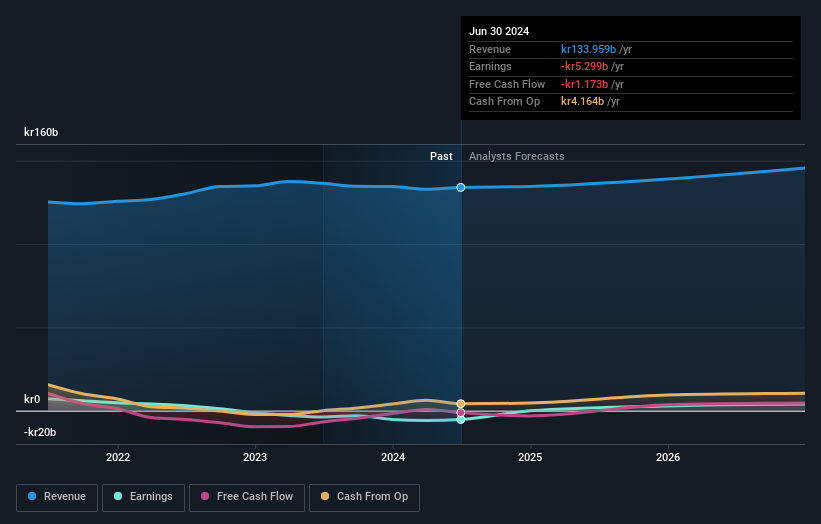- Sweden
- /
- Consumer Durables
- /
- OM:ELUX B
Institutional owners may consider drastic measures as AB Electrolux (publ)'s (STO:ELUX B) recent kr869m drop adds to long-term losses

Key Insights
- Given the large stake in the stock by institutions, AB Electrolux's stock price might be vulnerable to their trading decisions
- 52% of the business is held by the top 10 shareholders
- Insiders have been selling lately
Every investor in AB Electrolux (publ) (STO:ELUX B) should be aware of the most powerful shareholder groups. We can see that institutions own the lion's share in the company with 42% ownership. In other words, the group stands to gain the most (or lose the most) from their investment into the company.
And so it follows that institutional investors was the group most impacted after the company's market cap fell to kr26b last week after a 3.2% drop in the share price. This set of investors may especially be concerned about the current loss, which adds to a one-year loss of 17% for shareholders. Often called “market movers", institutions wield significant power in influencing the price dynamics of any stock. As a result, if the decline continues, institutional investors may be pressured to sell AB Electrolux which might hurt individual investors.
Let's take a closer look to see what the different types of shareholders can tell us about AB Electrolux.
See our latest analysis for AB Electrolux

What Does The Institutional Ownership Tell Us About AB Electrolux?
Institutions typically measure themselves against a benchmark when reporting to their own investors, so they often become more enthusiastic about a stock once it's included in a major index. We would expect most companies to have some institutions on the register, especially if they are growing.
AB Electrolux already has institutions on the share registry. Indeed, they own a respectable stake in the company. This suggests some credibility amongst professional investors. But we can't rely on that fact alone since institutions make bad investments sometimes, just like everyone does. When multiple institutions own a stock, there's always a risk that they are in a 'crowded trade'. When such a trade goes wrong, multiple parties may compete to sell stock fast. This risk is higher in a company without a history of growth. You can see AB Electrolux's historic earnings and revenue below, but keep in mind there's always more to the story.

Hedge funds don't have many shares in AB Electrolux. Our data shows that Investor AB (publ) is the largest shareholder with 17% of shares outstanding. In comparison, the second and third largest shareholders hold about 6.6% and 5.2% of the stock.
On further inspection, we found that more than half the company's shares are owned by the top 10 shareholders, suggesting that the interests of the larger shareholders are balanced out to an extent by the smaller ones.
While studying institutional ownership for a company can add value to your research, it is also a good practice to research analyst recommendations to get a deeper understand of a stock's expected performance. Quite a few analysts cover the stock, so you could look into forecast growth quite easily.
Insider Ownership Of AB Electrolux
The definition of company insiders can be subjective and does vary between jurisdictions. Our data reflects individual insiders, capturing board members at the very least. Management ultimately answers to the board. However, it is not uncommon for managers to be executive board members, especially if they are a founder or the CEO.
Insider ownership is positive when it signals leadership are thinking like the true owners of the company. However, high insider ownership can also give immense power to a small group within the company. This can be negative in some circumstances.
Our most recent data indicates that insiders own less than 1% of AB Electrolux (publ). It is a pretty big company, so it would be possible for board members to own a meaningful interest in the company, without owning much of a proportional interest. In this case, they own around kr49m worth of shares (at current prices). Arguably, recent buying and selling is just as important to consider. You can click here to see if insiders have been buying or selling.
General Public Ownership
With a 40% ownership, the general public, mostly comprising of individual investors, have some degree of sway over AB Electrolux. While this group can't necessarily call the shots, it can certainly have a real influence on how the company is run.
Private Equity Ownership
With an ownership of 17%, private equity firms are in a position to play a role in shaping corporate strategy with a focus on value creation. Some investors might be encouraged by this, since private equity are sometimes able to encourage strategies that help the market see the value in the company. Alternatively, those holders might be exiting the investment after taking it public.
Next Steps:
I find it very interesting to look at who exactly owns a company. But to truly gain insight, we need to consider other information, too. Consider for instance, the ever-present spectre of investment risk. We've identified 1 warning sign with AB Electrolux , and understanding them should be part of your investment process.
But ultimately it is the future, not the past, that will determine how well the owners of this business will do. Therefore we think it advisable to take a look at this free report showing whether analysts are predicting a brighter future.
NB: Figures in this article are calculated using data from the last twelve months, which refer to the 12-month period ending on the last date of the month the financial statement is dated. This may not be consistent with full year annual report figures.
New: Manage All Your Stock Portfolios in One Place
We've created the ultimate portfolio companion for stock investors, and it's free.
• Connect an unlimited number of Portfolios and see your total in one currency
• Be alerted to new Warning Signs or Risks via email or mobile
• Track the Fair Value of your stocks
Have feedback on this article? Concerned about the content? Get in touch with us directly. Alternatively, email editorial-team (at) simplywallst.com.
This article by Simply Wall St is general in nature. We provide commentary based on historical data and analyst forecasts only using an unbiased methodology and our articles are not intended to be financial advice. It does not constitute a recommendation to buy or sell any stock, and does not take account of your objectives, or your financial situation. We aim to bring you long-term focused analysis driven by fundamental data. Note that our analysis may not factor in the latest price-sensitive company announcements or qualitative material. Simply Wall St has no position in any stocks mentioned.
About OM:ELUX B
Undervalued with high growth potential.


